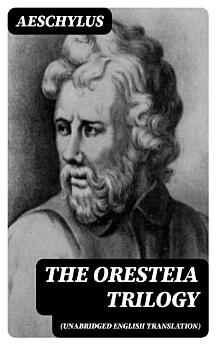The Oresteia Trilogy (Unabridged English Translation)
Aeschylus
giu 2022 · DigiCat
Ebook
336
pagine
family_home
Idoneo
info
reportValutazioni e recensioni non sono verificate Scopri di più
Informazioni su questo ebook
The Oresteia Trilogy, Aeschylus's masterwork, presents a profound exploration of justice, vengeance, and the evolution of societal norms in ancient Greece. Comprising three plays—Agamemnon, The Libation Bearers, and The Eumenides—this unabridged English translation captures the lyrical beauty and intricate construction of Aeschylus's language, while immersing readers in the rich tapestry of myth and tradition. The trilogy is notable for its intricate dialogue and the transition from personal retribution to collective civic responsibility, reflecting the tension between archaic blood feuds and the emerging concept of judicial law, set against the backdrop of the tumultuous aftermath of the Trojan War. Aeschylus, often hailed as the father of tragedy, was deeply influenced by the socio-political landscape of 5th-century BCE Athens. Having witnessed the devastating consequences of war and tyranny, his works grapple with themes of moral complexity and divine justice. The Oresteia trilogy serves as a commentary on the transition from an ancient worldview to a more enlightened rule of law, likely inspired by his engagement in Athenian culture and civic affairs. This seminal work is an essential read for anyone interested in the foundations of Western literature and drama. A compelling blend of intricate character dynamics and philosophical depth, The Oresteia invites readers to ponder the nature of justice through its characters' harrowing journeys. Whether approached as a socio-political critique or a timeless narrative of familial tragedy, it remains profoundly relevant and insightful.
Informazioni sull'autore
Aeschylus (circa 525/524 – 456/455 BC), often recognized as the father of tragedy, was one of the earliest and most illustrious playwrights of ancient Greek theater. Born into a noble family in Eleusis, Aeschylus lived through a period of Athenian prosperity and the emergence of democracy. His contribution to literature includes innovating the dramatic form by introducing a second actor to the stage, thus revolutionizing the potential for dialogue and dramatic conflict (Lesky, 1965). Aeschylus is believed to have authored around seventy to ninety plays, but only seven have survived to modern times, the most famous of which is undoubtedly 'The Oresteia Trilogy'. This trilogy, consisting of 'Agamemnon', 'The Libation Bearers', and 'The Eumenides', is a seminal work that explores themes of justice, morality, and divine influence in human affairs (Sommerstein, 1996). Aeschylus' tragedies are characterized by their grandiose language, complex characters, and intricate choruses. His works laid the foundation for subsequent generations of playwrights, including Sophocles and Euripides. The Oresteia itself is not only a cornerstone of ancient Greek drama but also a timeless piece that has influenced countless adaptations and interpretations across cultures and epochs (Goldhill, 1992). Aeschylus' literary achievements earned him numerous victories at the Athenian festivals, and his influence persists, cementing his place as a pivotal figure in the cannon of Western literature.
Valuta questo ebook
Dicci cosa ne pensi.
Informazioni sulla lettura
Smartphone e tablet
Installa l'app Google Play Libri per Android e iPad/iPhone. L'app verrà sincronizzata automaticamente con il tuo account e potrai leggere libri online oppure offline ovunque tu sia.
Laptop e computer
Puoi ascoltare gli audiolibri acquistati su Google Play usando il browser web del tuo computer.
eReader e altri dispositivi
Per leggere su dispositivi e-ink come Kobo e eReader, dovrai scaricare un file e trasferirlo sul dispositivo. Segui le istruzioni dettagliate del Centro assistenza per trasferire i file sugli eReader supportati.








